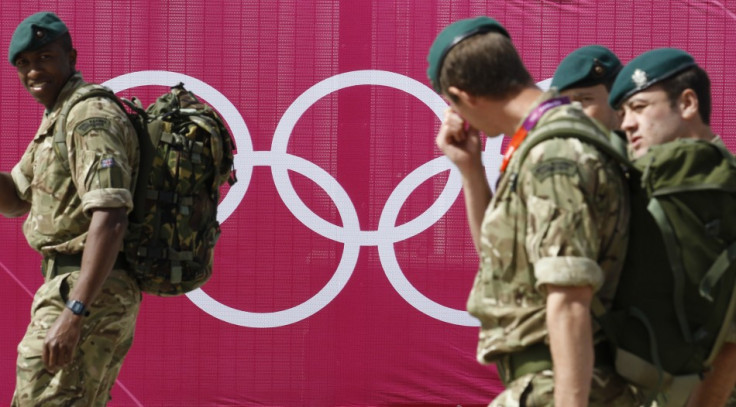EXCLUSIVE: Theresa May Wrong about G4S Olympics Security Farce, Says Soldier
Inconceivable Home Secretary only just aware of major security gaps, serving squaddie tells IBTimes

Theresa May's claim that the government knew that additional British Army soldiers were needed for Olympics security only on the day before she made the announcement has been branded inconceivable by a soldier drafted in at the last minute to work at the games.
The source, who asked to remain anonymous, revealed that soldiers were angry that they were being treated like the "cheap option" drafted in to carry out menial tasks at short notice. Those returning from active service abroad were at risk of burning out, he warned.
He claimed that troops were frustrated that the government knew of the shortfall for far longer than it claimed but delayed making a decision for as long as possible. Soldiers have had to cancel holidays and in some cases perhaps even their own weddings.
A member of an air assault infantry battalion, who has served in Afghanistan, the source told IBTimes UK that his regiment was informed that they would be needed for the games on 9 July - two days before May claimed she knew.
It was on the same day that May told the house that she was "confident our partners will deliver a safe and secure games".
The soldier said: "It is inconceivable to think that G4S, Locog and the government did not communicate about a £500m security contract and the severity of any shortfalls."
The home secretary came under fire from the shadow cabinet after the government announced that an additional 3,500 troops would be required to plug gaps in staffing for security contractor G4S. The move will bring the total number of armed forces personnel involved in the games up to 17,000.
Scale of Olympics security staff shortfall
May remained defiant in the face of Labour criticism that the government was not aware of the scale of the shortfall until 11 July and had to act promptly.
"A consultation process must have been ongoing to make the decision to incorporate a further 3,500 soldiers to plug gaps/bolster the deficit," said the soldier. "This must have happened before the announcements."
The revelation adds weight to claims by Labour's Keith Vaz, chairman of the home affairs committee, that Locog and the government had been aware of the security risks for several weeks. The government waited until it had no choice but to "literally send in the troops," he told the Commons.
Soldiers' frustration at the 'cheap option'
The soldier described the atmosphere among troops as being a mixture of a sense of duty and of frustration. Members of the armed forces were aware that they could be called on at any time but felt that they had been used as a last-minute patch for a leak that should have been plugged weeks, or even months, ago.
"It appears that someone at G4S or the government had been sitting on the information for some time," he said. "The security situation is important and it would be an international embarrassment if it was to fail - the overall military contribution is still significantly lower than that of China in 2008," the soldier said.
"Soldiers are like any other employee - they do not like being given short notice for tasks and the overall feeling is that we're going to be conducting menial tasks as the cheap option. I doubt that soldiers that have had annual leave postponed or cancelled will be happy that they are being deployed.
"Missing events is a nuisance but always a risk with the army. However there are some who are due to marry during this period and now those weddings are in jeopardy."
May revealed that the armed forces would be rewarded for their hard work with hundreds of free tickets for the Olympics, Paralympics and the opening ceremony. Her comments drew a cheer of approval from the house but the soldier dismissed the gesture as "all well and good" but scant recompense for the soldiers who were on duty.
Soldiers would be expected to carry out "basic" roles such as car park and venue security, he said.
Scathing critique of G4S
He gave a scathing critique of G4S, echoing Labour calls for financial penalties for the mishandling of the games' security.
"They are one of the biggest private security firms but they diversify too much. Pooling staff from agencies and not being able to fulfill their commitments with this much lead time is amateurish."
May told the house that any issues of financial penalties would be the responsibility of Locog, who contracted G4S, to carry out. The Telegraph revealed that the firm had seen its fee rise by £53m over the period of preparation for the games.
Shadow home secretary Yvette Cooper branded the situation "another Home Office shambles". She told May in the house: "Please get these security problems sorted out and stop letting everybody down."
London mayor Boris Johnson told reporters that the security problems were down to "pre-curtain-up jitters". He added he was "confident that at this stage London is better prepared for the Olympics than any previous Olympic city has ever been".
© Copyright IBTimes 2025. All rights reserved.





















